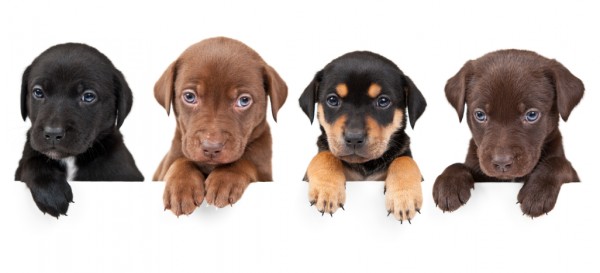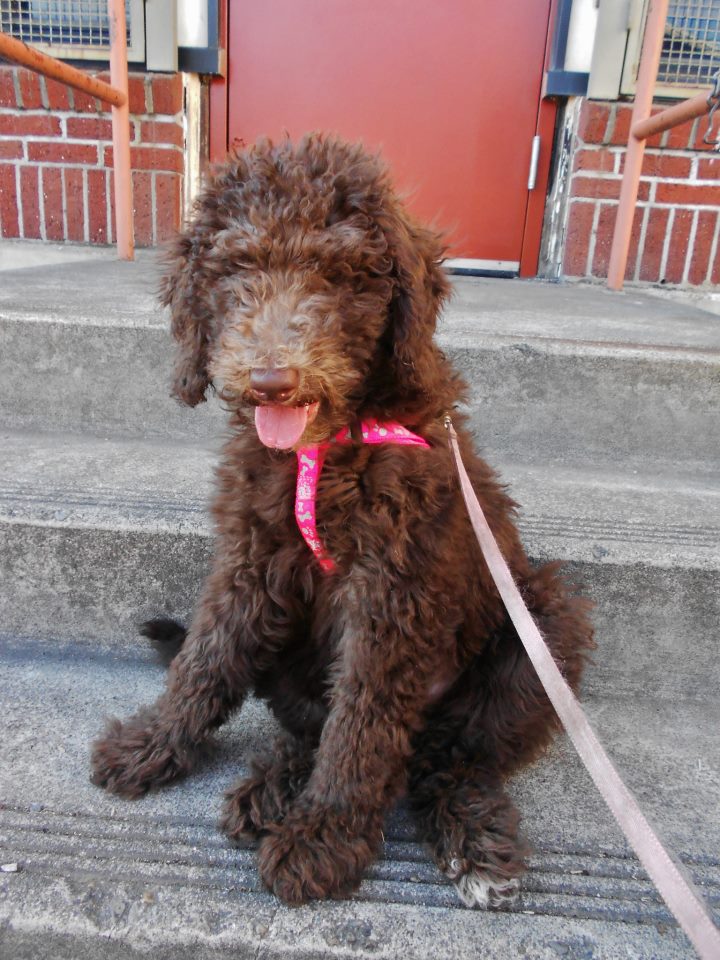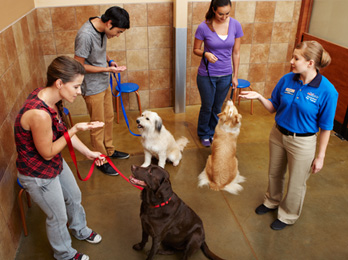



 Puppies are most accepting of new experiences between 3 and 12 weeks old. After that age, they become much more cautious of anything they haven’t yet encountered. From about 12 to 18 weeks old the opportunity to easily socialize the puppy ends-and with each passing week it becomes harder to get the pup to accept and enjoy something that he’s initially wary of.
Puppies are most accepting of new experiences between 3 and 12 weeks old. After that age, they become much more cautious of anything they haven’t yet encountered. From about 12 to 18 weeks old the opportunity to easily socialize the puppy ends-and with each passing week it becomes harder to get the pup to accept and enjoy something that he’s initially wary of.
After 18 weeks old, it’s much more difficult, and sometimes impossible, to teach a dog to like something new, or help him become comfortable with something he finds frightening.
Early Puppy Socialization is an important part of being a new puppy parent and must be taken seriously. Puppy socialization requires exposure to all types of new people, animals, places, sounds and experiences that you’ll expect your dog to be comfortable with in your life together.
Depending on your lifestyle this might include the sight and sound of trains, garbage trucks, water, boats, cars, schoolyards of screaming children, crowds, cats, livestock or crying infants.
While it’s impossible to expose a young puppy to absolutely everythng they’ll encounter in life, the more bases you start to cover during the peak socialization period of 3 to 12 weeks, the more likely the puppy will be able to generalize from his prior experiences and find something reassuringly familiar in new situations.
First, make sure you’re getting your new puppy from a reputable dog breeder who raises their puppies in a home environment, with their parents and not in a kennel type environment also helps immensely since they’re with the breeder for over half of this “early socialization stage”.
The end goal of puppy socialization is to get your puppy familiar and desensitized with the most common types of people, dogs, sights, sounds and physical handling and grooming that will be a sure part of his daily life and for the rest of their lives.
If you’re getting a dog with a coat type that needs lots of grooming like a Labradoodle, Aussiedoodle or Poodle then it is extremly important that you start early to desensitize them to being handled all over their bodies and tools groomers use like brushes and combs, the sound and feeling of blow dryers etc.
Touching and brushing them all over their bodies and you want to do this as often as possible (paying close attention to their paws, ears and face) will help prepare them for the many grooming appointments they’ll eventually start to experience and your new groomer will also appreciate this.
 Yes! You need to make sure that the situation is not overwhelming for him, and that he becomes more comfortable-not more worried-each time you expose him to something. For instance, maybe you’ve planned a puppy party where a group of people will gather to help you socialize your puppy right at home. But some puppies can be overwhelmed by meeting a bunch of strangers all at once.
Yes! You need to make sure that the situation is not overwhelming for him, and that he becomes more comfortable-not more worried-each time you expose him to something. For instance, maybe you’ve planned a puppy party where a group of people will gather to help you socialize your puppy right at home. But some puppies can be overwhelmed by meeting a bunch of strangers all at once.
Even though your intentions are good, if your puppy is cowering in the corner at his own party, then he’s not learning anything good about strangers!
The rule of thumb with puppy socialization is to keep a close eye on your puppy’s reaction to whatever you expose him to so that you can tone things down if your pup seems frightened.
Always follow up a socialization experience with praise, petting, a fun game or a special treat.
Even though 3 to 12 weeks old is a time when puppies are most comfortable with new experiences, they might sometimes find a new experience frightening. Whenever this happens, it’s important to introduce your puppy to the scary situation much, much more gradually, and to make a big effort to do something your puppy loves during the situation or right afterwards.
For example, if your puppy seems to be frightened while sitting on your lap in a schoolyard full of children, then sit further away from the action and offer your pup a delicious treat each time a scary noise or movement happens.
Another solution is to go to a much quieter park where only a few children are playing, use praise and treats to help convince him it’s a great place to be, and then over days or even weeks of your socialization sessions, gradually approach a schoolyard again once he’s started to like the sights and sounds of active children.
(For more detailed information, please read the article, Fear of Children.)
Give your puppy the best possible start by making sure they have early, safe and POSITIVE experiences with a variety of people, places, surfaces, sounds and temperatures.
Never force your pup to approach anyone or anything, let them explore on their own terms, and quietly praising and encouraging them when they boldly approach something new by themselves.
NEVER coddle your pup, if your puppy shows signs of fear or nervousness, the worst thing you can do is console or “baby” them which can be taken as praise for the undesirable behavior instead of consolation. Its better to calmly ignore the behavior and silently remove them from the situation and then try again slower or at a later time.
When your puppy seems uncertain take them away from the thing that is causing them stress until you have a happy puppy again and try again for a shorter amount of time or take a different approach.
Encourage them to approach at their own rate again, such as having that ‘scary’ person kneel down to the side and ask them not look at the puppy directly, which can be intimidating, have them hold out a treat or a toy for them and if they approach have them gently praise and pet them.
For example, if they’re uncertain about water maybe you can get in the water yourself and play with a toy, making it seem like great fun, when they start taking steps to join you, even for just a little, reward and praise their bravery! Food and toys are a great way to encourage your puppy to be brave as well!
Keep in mind you’re not trying to overwhelm your puppy with new experiences – quantity is not better than quality! Make sure your puppy is confident, well rested and having a good time whenever you introduce something new.
Don’t overdo it either! Puppies get tired and overwhelmed very quickly, and most importantly give your dog lots of downtime after a new experience to recuperate and reflect on what she’s been exposed to in a safe, quiet place.
 One great way to help socialize a puppy is to attend puppy kindergarten classes which most of the Petsmart and Petco’s around the country offer for only about $100 for a 6 wk class. You can also do a local google search to find one. I’ve attended one of the classes at Petsmart and it was great!
One great way to help socialize a puppy is to attend puppy kindergarten classes which most of the Petsmart and Petco’s around the country offer for only about $100 for a 6 wk class. You can also do a local google search to find one. I’ve attended one of the classes at Petsmart and it was great!
It will depend on the trainer they have but it works for what your looking for. Puppy Socializing and maybe learning some basic obedience commands.
These classes are designed especially for young puppy training and early socialization. In a typical puppy class, off-leash play and even innocent play-fighting helps socialize puppies with each other, teaches them to be gentle with their mouthing and biting, and gets them used to being handled by a variety of people.
Some classes even include exposure to odd sights and sounds using props, CDs of sounds, and theatrics with costumes to accustom the puppies to a wide range of life experiences.
Puppy classes can also teach some basic obedience skills, so on top of the socialization component, you’ll learn how to ask your pup to comply with your requests and behave according to your expectations.
Most young puppies aren’t fully protected against the diseases we vaccinated them for until they’ve had all of their puppy shots. This is mainly because the antibodies they get from their mother can interfere with the ability of the vaccine to have its full effect.
Even though puppies’ immune systems are still developing during their early months, if we wait until a puppy has all of his shots before socializing him, we miss our chance to do it.
They’ll simply be too old to take advantage of early socialization and then introduction to new things can become much harder.
The good news is that if you take some commonsense precautions while socializing your puppy, the risk of infection is quite small compared to the much larger risk of your puppy developing serious behavior problems with fear and aggression later in life.
Use the early weeks to get them socialized to as many new and different types of people, sounds, smells and situations as possible and hold off on the dog parks and “stranger” doggy socializing for after they’re fully vaccinated.
Veterinarians specializing in behavior recomÂmend that owners take advantage of every opportunity to socialize young puppies in environments like puppy classes, where the risk of illness can be minimized and all puppies have at least had the start of their vaccines.
Behavioral Experts and Vets have stated that: “Puppy socialization classes offer a safer and organized means of socializing puppies.
Each puppy should have up-to-date vaccinations and be disease and parasite free before entering the class. Where possible, classes should be held on surfaces that are easily cleaned and disinfected (e.g., indoor environments).
Visits to dog parks or other areas that aren’t sanitized or are highly trafficked by dogs of unknown vaccination or disease status should be avoided.â€
The experts now agree that the risk of a puppy being given up or later euthanized for behavior problems is so huge that young puppies must be socialized before they are done with their vaccinations.
The recommendation is to socialize puppies as safely as possible by exposing the puppy to people, places and other animals while not taking unnecessary risks like dog parks and high dog traffic areas.
Well-run puppy classes-indoor classes where all the puppies have been vaccinated at least once – are a safe and smart way to socialize a puppy. “In general, puppies can start puppy socialization classes as early as 7 to 8 weeks of age. Puppies should receive a minimum of one set of vacÂcines at least 7 days prior to the first class and a first deworming.
They should be kept up-to-date on vaccines throughout the class.” “The American Veterinary Society of Animal Behavior believes that it should be the standard of care for puppies to receive such socialization before they are fully vaccinated.”

12 wk old Labradoodle puppy “Aero” at swimming class. Aero is now a dock diving champion! Thanks to early exposure to the water and dog training!
Final Remarks
Socialization is essential for helping your puppy develop into a happy, fun and safe companion. Most people find it easier and more enjoyable to live with a dog who’s relaxed with strangers, gets along well with dogs and adapts easily to new experiences.
While some dogs are born with genetic predispositions that can make this difficult or impossible, most dogs are very impressionable when young and can learn to take everything in stride. Socializing your puppy gives him the greatest chance possible to develop into a dog who’s comfortable in his environment and a joy to be with.
Also Check out: Best Natural Dog Food: 10 Recipes Without Artificial Ingredients